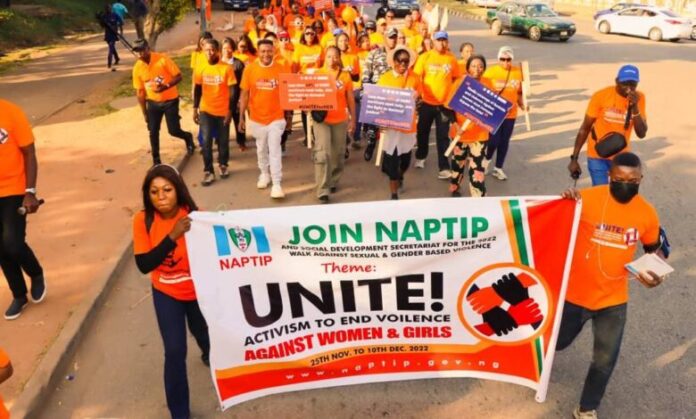The National Agency for the Prohibition of Trafficking in Persons (NAPTIP) has kicked off the 2025 edition of 16 days activism against gender-based violence (GBV) today (Tuesday).
NAPTIP annually unveils a series of events as part of the ‘16 days of activism against gender-based violence’ campaign, which runs globally from November 25 (International Day for the Elimination of Violence against Women) to December 10 (Human Rights Day).
Briefing newsmen at a press conference for commencement of the 16 days activism, the Director General, NAPTIP, Binta Adamu Bello, said the campaign symbolises the urgency and the collective responsibility to combat gender-based violence.
According to her, the 16 days activism serves as an opportunity to raise awareness, advocate for policy change, and encourage community action.
“It reminds us that ending violence is not only about policy but also about societal transformation—changing mindsets, challenging harmful norms, and fostering respect and equality,” said Bello.
This year’s campaign theme, as led by the United Nations, focuses on ending digital violence against all women and girls with the purpose of raising awareness about gender-based violence, advocating for policy changes to prevent and respond to violence against women and girls, promoting a culture of respect and equality, and supporting survivors and amplifying their voices.
Highlighting the efforts of the agency in addressing gender-based violence against persons, Bello said NAPTIP has secured the conviction of over 40 offenders in relation to Sexual Gender-Based Violence (SGBV), while several cases are pending at various stages in the courts.
Bello said the conviction included two life sentences, the recent being the conviction of a 19-year-old school teacher from Kwali who raped his nine-year-old pupil.
She explained that NAPTIP has continued to respond swiftly to distress calls by victims through its Rapid Response Team, domiciled within the Violence Against Persons Department
“We recognise the devastating impact of gender-based violence, especially on women and girls in Nigeria. Our mandate extends beyond combating trafficking to include a broader spectrum of violence against persons. Through proactive awareness campaigns, rehabilitation programmes, and enforcement of laws, we are committed to protecting victims and bringing perpetrators to justice.
“Our efforts include community outreach initiatives aimed at educating the public on the dangers of trafficking and violence, as well as providing support services to survivors. We have also partnered with various stakeholders to implement intervention programmes, ensuring that victims receive psychological, legal, and social support,” she said.
The director, however, identified enforcement as a great challenge, given societal attitudes and cultural norms.
She, therefore, called on all sectors of society—traditional rulers, religious leaders, community organisations, and individuals—to uphold the tenets of the Violence Against Persons Prohibition, VAPP Act, and foster an environment where victims can come forward without fear.
The director maintained that ending gender-based violence must be a collective action but not the responsibility of the government alone
“I wish to remind us that due to the escalating insecurity in some parts of the country which has brought about large-scale displacement, there has been an increased level of SGBV across the country. This simply means additional responsibilities for all frontline respondents and stakeholders.
“In addition, society’s role is pivotal in changing perceptions and behaviors that condone or perpetuate violence. We urge parents and guardians to educate young boys and girls on gender equality and respect. Religious and cultural leaders must be at the forefront of advocating for non-violence and the protection of vulnerable groups.
“We urge community members to be extra vigilant and proactive in reporting abuse, supporting victims, and condemning acts of violence. Civil society organisations and the media also play critical roles in raising awareness, holding perpetrators accountable, and pushing for policy reforms,” she said.
She unveiled the activities of the 16 days activism to include: Awareness Walk at the Old Parade Ground on Friday, November 28; High Level Policy Dialogue at Abuja Continental Hotel on Wednesday, December 3; and Mental Health Training on Friday, December 5.

